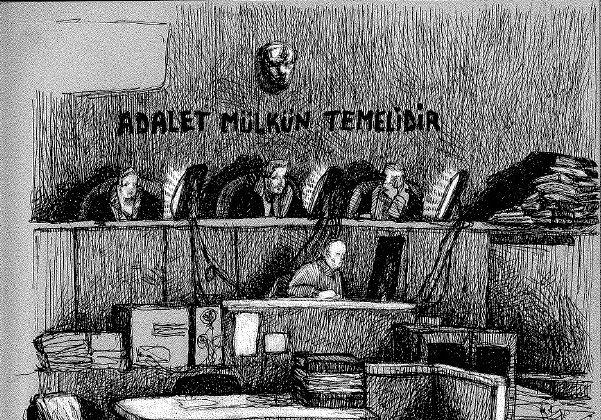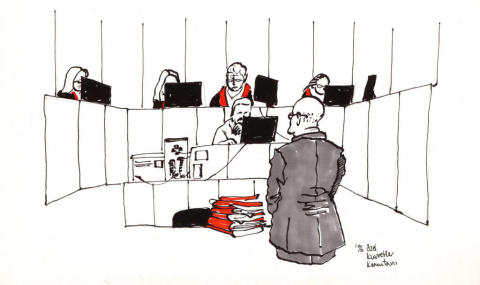
Trial Monitoring: State, suspects, victims and lawyers in courtroom
Drawing: Vardal Caniş
Hafiza Merkezi and Sirnak Bar Association has started implementing trial monitoring activities, as part of their joint project that began in the first half of 2016. In this framework, we have started monitoring systematically the trials of 6 cases on enforced disappearances, with reference to the universally accepted standards of trial monitoring.
What is Trial Monitoring?
Trial monitoring is the process of collecting information and reporting on the problems of judiciary – both procedural and substantial in nature – based on the impartial observation of judicial processes and all the actors with influence on these processes. The act of observation is usually followed by media and advocacy work with the intention to popularize the monitored cases and the identified problems in public space. Trial monitoring increases the transparency of judicial process by way of observing from different angles the way public trials are carried out, the behaviors of suspects, possible insults faced by victims and the attitudes adopted by the court, prosecutors and lawyers.
Why is it Important?
Trial monitoring activities are carried out to;
- Collect impartial and reliable information on judicial processes and problem areas,
- Create pressure at national and int’l level for the establishment of political will for judicial reforms and accountability,
- Enhance transparency of public trials,
- Empower the voices of victims,
- Support the right to justice and fair trial,
- Develop concrete advocacy and strategies for the solution of problems,
- Create public awareness through media,
- Identify areas of political and institutional reform.
Who Monitors Trials?
- Local and int’l civil society organisations and networks,
- Mass organisations and networks,
- Bar associations and lawyers,
- Media workers.
Trial Monitoring Training
Prior to beginning monitoring activities, as project partners we have carried out a 3-day training with the title “Transitional Justice Mechanisms During Ongoing Conflict, World Experience and Turkey” between September 30 – 2 October 2016 in Istanbul. A total of 72 people, mostly made up of lawyers, have taken part in the training.
During the training, Tina Gewis from the Organization for Security and Cooperation in Europe (OSCE) carried out a training with illustrated case examples on the method of trial monitoring that they have developed and implemented. This was followed by Deniz Yıldız sharing her experience as part of Amnesty International Turkey’s trial monitoring activities. At the end of the meeting, monitoring teams were formed in preparation for the trial monitoring activity to be carried out for the cases of enforced disappearances in Turkey.
Trial Monitoring Teams
At final session of the training, 6 teams were set up to monitor The Musa Anter and the Main JİTEM Case, The Kızıltepe JİTEM Case, The Ankara JİTEM Case, The Dargeçit JİTEM Case, The Lice Case and The Kulp (Yavuz Ertürk) Case.
Monitoring teams are interdisciplinary and voluntary. Despite the majority of lawyers, we made sure that each group included at least one journalist and one social scientist. Furthermore, we have added a permanent drawing artist to all groups, to better transmit the feeling tone of the trials.
The teams implement their monitoring activities in line with the guidance of OSCE’s manuel Trial Monitoring: A Reference Manual for Practitioners, which is translated to Turkish by Hafiza Merkezi as part of the project.



